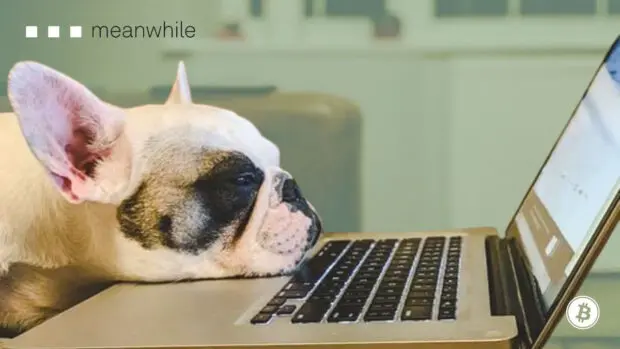This article is sponsored by Meanwhile
Bitcoiners anticipate “Bitcoinization” driving a shift toward a bitcoin-dominated global economy with its own GDP (Gross Decentralized Product), requiring bitcoin’s evolution from a store of value to a functional currency. Life insurance premiums, contributing 2-3% to the GDP in developed countries, play a crucial role. Meanwhile is leading the charge in this endeavor, building the first life insurance company for the bitcoin economy.
What Is “Bitcoinization”?
In short, “Bitcoinization” refers to the process of bitcoin coming to dominate the global economy. More fully, this would entail the digital asset becoming widely accepted and used as a medium of exchange, store of value, and unit of account. The process of Bitcoinization involves the gradual transition from traditional fiat currencies to Bitcoin for conducting transactions, making investments, and storing value.
In a fully Bitcoinized economy, people, businesses, and institutions would rely significantly on Bitcoin for their financial activities. Bitcoin would at least partially replace fiat currencies, although some Bitcoiners anticipate fiat currencies continuing to exist alongside bitcoin.
One key indicator for when Bitcoinization has taken place will be when people no longer refer to the “price” of bitcoin, but rather the exchange rate of BTC relative to other goods and services. Bitcoin will be viewed by “tradfi” similar to any other large global currency (the Japanese Yen, the British Pound etc.), rather than its current perception by many as merely a financial asset such as a stock.
Zac Townsend, CEO and co-founder of Meanwhile, the first bitcoin-denominated life insurance company, has already made the switch. He prefers to think in terms of the “exchange rate” between Bitcoin and other assets, utilizing this view to guide the direction of Meanwhile to help make Bitcoinization a reality.
How Far Away Is The Bitcoin Economy?
Currently, bitcoin is viewed as a store of value.
This means people buy it but prefer not to spend it. Instead, they hold onto it (or “HODL”—Hold On for Dear Life) because they believe that bitcoin is substantially undervalued, and will therefore be worth considerably more in the future.
The situation is currently dominated by Gresham’s Law, which states that “bad money will drive out the good”. As fiat currencies (bad money) continue to devalue due to expansions in the money supply, people hoard their bitcoin (good money) as it appreciates in value relative to their country’s legal tender fiat.
For the bitcoin economy to become a reality, it will require a high degree of monetary velocity, which is when bitcoin changes hands rapidly throughout the economy. To accomplish this, it needs to replace fiat currencies as the dominant means of payment.
This is the opposite of Gresham’s Law and known as Thier’s Law which states that “good money will drive out the bad.” There are two ways this can happen:
- Fiat currencies become overly devalued due to hyperinflation, rendering them worthless, with merchants only accepting the currency with the higher value (bitcoin);
- Bitcoin becomes more useful due to the greater number of financial services, products, and investment opportunities denominated in bitcoin.
Logically then, there are two ways of achieving the bitcoin economy: wait until fiat currencies become hyperinflated, or create enough products and services denominated in bitcoin that they begin to dominate the markets. Of course, these are not mutually exclusive as both can happen simultaneously.
What Is The Potential Of The Bitcoin Economy?
Townsend believes that the bitcoin economy could rank amongst the top 5 economies within 50 years. It may sound ambitious, however the growth of Bitcoin adoption could become exponential once the ball gets rolling. As more products, services, and opportunities are created that are denominated in bitcoin, adoption will grow and the value of the economy will increase relative to the existing fiat ecosystem.
This economy could be measured in Gross Domestic Product “GDP”, however a more accurate definition would likely be Gross Decentralized Product (reflecting Bitcoin’s borderless nature). As this bitcoin economy becomes more capital-rich, more people, businesses, and institutions will be incentivized to participate. They will begin investing in the economy through various means, even simply by acquiring and spending bitcoin.
How Is Meanwhile Helping Facilitate Bitcoinization?
Roughly 2-3% of the GDP of developed countries comprises life insurance premiums. That’s a significant chunk for only one industry.
Meanwhile is the world’s first life insurance company denominated entirely in bitcoin. They accept their premiums in bitcoin, and they pay out their claims in bitcoin. They even offer customers the ability to borrow against their claims, also in bitcoin. Currently only offering their services to customers in the U.S., Meanwhile hope to broaden their offering to other parts of the world, eventually servicing citizens across the globe.
Although Meanwhile is not the first company to offer bitcoin-denominated products, they are the first major financial product to be denominated entirely in bitcoin. Given the highly regulated nature of the insurance industry, Meanwhile is regulated by the Bermuda Monetary Authority, a world-leading insurance regulator. Offering life insurance in bitcoin may be the first step to legitimizing bitcoin as a currency for financial and investment products, potentially leading to a cascade of other businesses doing the same.
Why Bitcoin Must Become Boring
Bitcoin is still relatively fresh. Its proponents consider it an exciting, even revolutionary tool for fixing the global monetary system and bringing an end to the constant debasement of national currencies around the world. However, much of the general public is skeptical. The myth that bitcoin is a Ponzi scheme is still rampant, and as the saying goes: “A lie can travel halfway around the world while the truth is putting on its shoes”.
Fortunately, mistrust is slowly giving way to curiosity, and curiosity may yet give way to acceptance. In order for this to occur though, bitcoin cannot be viewed by the public at large as representing “revolutionary money” or “internet money”. Revolutions can fail and the internet remains an untrustworthy ecosystem for many people. Most people don’t want these type of money, they simply want standard, normal, boring “money”.
This is why Bitcoin must become boring in order to succeed. When the public sees that insurance, banking, and investing are all being denominated in bitcoin, they will become comfortable with it. When they see that they can buy houses, cars, groceries, and vacations with bitcoin, they will relax around it. People need to feel that bitcoin is harmless, not that it could suddenly lose all its value at a moment’s notice.
As adoption continues its slow march onward and Bitcoin’s velocity increases, the price (or exchange rate) of bitcoin will become less volatile, making it feel safer to the general public.
Life insurance is boring, and that’s just what bitcoin needs right now.
Conclusion
In conclusion, Bitcoin remains a store of value for the moment. For Bitcoinization to take place however, it needs to become a true globally accepted currency. As this occurs, we expect velocity to increase, alongside the prevalence of additional bitcoin-denominated goods and services, in order for the bitcoin economy to materialize.
Meanwhile is offering the very first bitcoin-denominated life insurance, which will accelerate Bitcoinization by creating real-world use cases and familiarizing the public with bitcoin as a bona fide currency.










